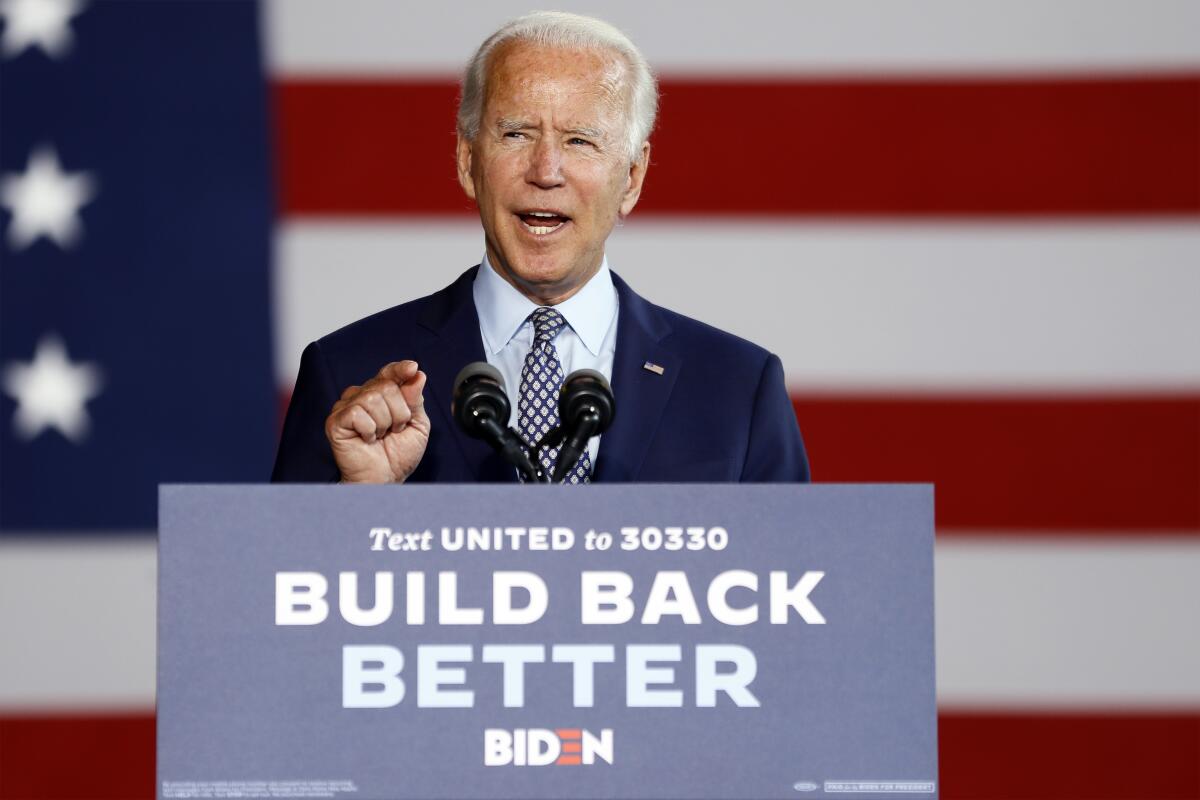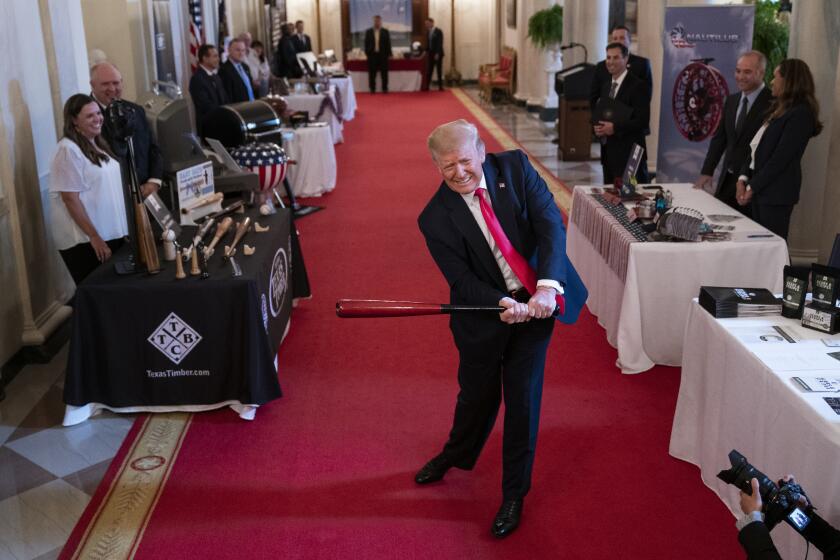Joe Biden touts $700-billion plan to boost U.S. manufacturing

- Share via
Joe Biden laid out a populist economic vision on Thursday, starting with a $700-billion proposal to reinvigorate the nation’s manufacturing sector, and laced into President Trump for being out of touch with the challenges facing the American public.
Speaking at a metal works plant in Dunmore, Pa., the presumptive Democratic presidential nominee said the barrage of crises pummeling the nation — the coronavirus pandemic, the subsequent economic fallout, the turmoil over racial injustice — offer an opportunity for sweeping improvement to “build back better,” as he dubbed his recovery plan.
“This is our moment to imagine and to build a new American economy for our families and for our communities — an economy where every American has the chance to get a fair return for the work they put in, an equal chance to get ahead,” he told his socially distanced audience of about 50 people.
By turning his focus to the economy, Biden aims to chip away at one of the few advantages the president still has. Polls have shown voters continue to trust Trump more to handle the economy than Biden, though overall the former vice president has built steady advantages in the national matchup, battleground states and key demographics such as women and senior citizens.
A spate of polls in recent weeks show Joe Biden building a substantial lead in his race against President Trump.
The manufacturing proposal, the first plank of four initiatives Biden is planning to roll out in the coming weeks, includes spending $300 billion on research and development projects in clean energy, telecommunications, artificial intelligence and other fields. He would also commit to $400 billion in his first term for federal procurement of American-made products ranging from clean vehicles to construction materials. The promise of government purchases, the campaign said, will give businesses confidence to hire additional workers.
The campaign did not specify how it would pay for the new spending, but Biden has broadly endorsed rolling back some of the Trump administration’s tax cuts and said in his speech he would increase the corporate tax rate to 28%. (Trump and Republicans cut that rate from 35% to 21% in 2017.)
The Biden plan also aims to boost domestic production by tightening rules on what products can be designated “made in America” and updating international trade rules around government procurement. It also includes previously announced measures to manufacture more medical equipment and other critical supplies to battle pandemics, after the U.S. reliance on international supply chains proved to be faulty in the current coronavirus crisis.
For months, the former vice president has signaled a shift in his economic thinking spurred by the public health and financial crises gripping the country. Instead of promising a return to normalcy — which defined his message during the presidential primary — Biden began talking up bold, transformational change as necessary to address the upheaval brought by the coronavirus. The manufacturing proposal offers a glimpse at how Biden is translating that rhetoric into policy.
Much like Trump in his 2016 campaign, Biden struck a populist tone, promising to advocate for the American worker who has seen manufacturing job prospects decline in the globalized economy. But Biden used that line to draw a contrast with his opponent, painting Trump as siding with elites and showing little interest in learning about the stresses faced by everyday Americans.
He promised “an economy that says investing in American people and working families is more important than the nearly $2 trillion in tax breaks, predominantly handed out to the super-wealthy.
“Donald Trump loves to talk and talk and talk, but after 3½ years of big promises, what do the American people have to show for all the talk?” he said.
Never shy to use his biography to punctuate a point, Biden referenced chapters in his own life — his middle-class upbringing in nearby Scranton, his experience as a single father raising two young sons after his first wife died in a car accident — to show his familiarity with the challenges many are facing. Trump, he said, couldn’t relate.
“It’s unconscionable that he doesn’t even try to understand or empathize with the struggling of so many millions of people out there,” he said.
He excoriated Trump’s handling of the coronavirus outbreak, which has killed more than 130,000 people in the U.S., and accused him of stoking tensions in the current reckoning over racial justice.
“That’s the tragedy of Donald Trump being our president today,” he said. “He is exactly the wrong person to lead us at this moment.”
In a sign of how crucial Pennsylvania, a longtime blue state that flipped to Trump in 2016, will be in November, Vice President Mike Pence was also in the state on Thursday, meeting with business leaders in Malvern to discuss reopening the American economy and schools.
Hospitals in Texas and Arizona are straining, and caseloads are soaring nationwide, but Trump continues to downplay the coronavirus and advocate reopening.
Pence spoke optimistically about the country’s economic prospects, saying he sees “this country coming back because of the solid foundation that was put in place” by the White House’s pre-coronavirus accomplishments, such as tax cuts, rollbacks of regulation and negotiations of new trade deals.
He repeatedly knocked Biden, warning that the Democrat would hike taxes and carry out a “government takeover of healthcare.”
Biden’s speech came one day after his campaign, in a joint effort with his former rival, Sen. Bernie Sanders of Vermont, released policy recommendations for the Democratic Party policy platform. Like Biden’s manufacturing proposal, the recommendations embrace robust government action but steer clear of some of the more sweeping, and controversial, items on progressives’ wish list, such as “Medicare for all,” a Green New Deal or defunding the police.
The framework was created by six task forces composed of Biden and Sanders allies, which was meant to smooth over lingering tensions from the Democratic primary.
Biden commended their work as “helping build a bold, transformative platform for our party and for our country.”
“And I am deeply grateful to Sen. Sanders,” he said in a statement, “for working together to unite our party, and deliver real, lasting change for generations to come.”
Sanders, acknowledging the policy disputes he had with Biden, also complimented the outcome.
“Though the end result is not what I or my supporters would have written alone, the task forces have created a good policy blueprint that will move this country in a much-needed progressive direction and substantially improve the lives of working families throughout our country,” he said.
Some in the party’s left flank say they’re heartened by the moves Biden has made so far to follow through on his pledge for aggressive action.
“Biden’s bold moves recently seem less like a political hat tip to progressives and more him rising to this moment we’re living in,” said Adam Green, co-founder of Progressive Change Campaign Committee, a left-leaning group allied with Massachusetts Sen. Elizabeth Warren. Green applauded Biden’s manufacturing plan for drawing inspiration from Warren’s proposal to use federal procurement to plow money into American-made products.
The other pillars of Biden’s economic plan, to be detailed in future speeches, include developing clean energy and sustainable infrastructure, building up a workforce of caregivers and educators, and advancing racial equity.
More to Read
Get the L.A. Times Politics newsletter
Deeply reported insights into legislation, politics and policy from Sacramento, Washington and beyond. In your inbox twice per week.
You may occasionally receive promotional content from the Los Angeles Times.













